What an awesome first day of Challenge B!
We opened up the day by taking a moment to get to know one another by asking each other questions. Then the students took turns introducing each other based on what they learned. I love this, the grammar, dialectic, and rhetoric stage in action. Then we opened our time up by talking about “Gentleness” from the 30 Character Qualities and Proverbs 12:18, “The reckless words pierce like a sword, but the tongue of the wise brings healing” (NIV). The best of our time was spent defining and comparing the words “reckless” and “wise.” Some of the definitions that Challenge B came up with for reckless was “chaos, without thought, and out-of-control.” To define the term “wise,” students came up with words like “order, experienced, and good decisions.” Based on these, we had an excellent talk this morning about Gentleness. What a great verse to open up our year. In Challenge B, there will be lots of opportunity to use our tongues wisely.
For Grammar Latin B: We opened up by talking about the seminar overview in our Challenge B Guides. We honed in on a concept from the Toward Virtue section on page 12. “Translating Latin trains students in style and leads them toward communicating truth and beauty more clearly.” We brought this back to our conversation about “Gentleness” and Proverbs 12:18. We also reacquainted ourselves with our Henle Latin books and talked about what three things success in Latin depends on. We reviewed rules 53 and 26 and declined the noun “terra, ae.” We parsed and translated sentences from exercises 5 and 6.
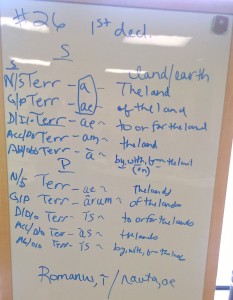
We had a 5CT defining and comparing 1st and 2nd declension nouns like nauta and Romanus.
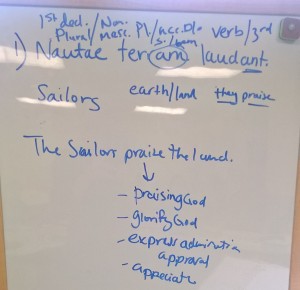
We touched on Rhetoric: Logic in Latin when a discussion arose about the sentence, “The sailors praise the land” and the importance of making a distinction between two different meanings for the word “praise.” How cool is it that this is exactly one of the concepts students will learn in Logic this week (see Lesson 1, Introductory Logic)?
For Research History of Science: We opened up by reading and discussing the Hippocratic Oath and had some awesome discussions.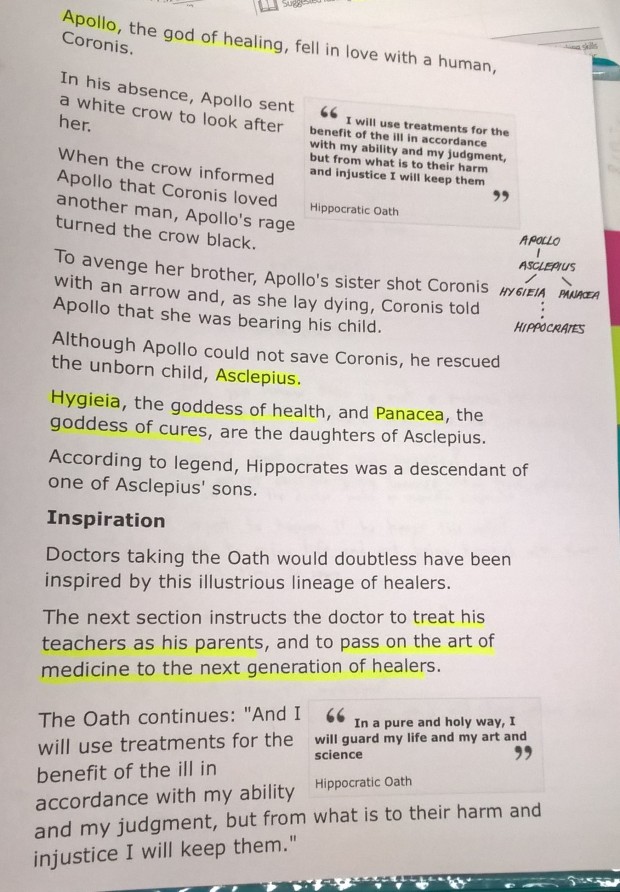
Thank you Alejandro for bringing in the information on the gods of Hippocrates.
We read from our Challenge B guide and discussed an article called, “Assisted Suicide and Real Death with Dignity” from Christianity Today (http://www.christianitytoday.com/ct/2015/september/assisted-suicide-and-real-ddeath-with-dignity.html). Great article. We introduced Archimedes by reading about him, creating an outline, and then making statements based on our outline and what we learned. We had another “Logic” conversation based on the word, “neutral” and we closed with a 5CT by defining and comparing the Bible and the Hippocratic Oath. We talked about Hippocrates and concluded together that his wise words in the Oath promoted “healing” and prevented “recklessness” and is still promoting and preventing the same today (back to Proverbs 12:18 and “Gentleness”).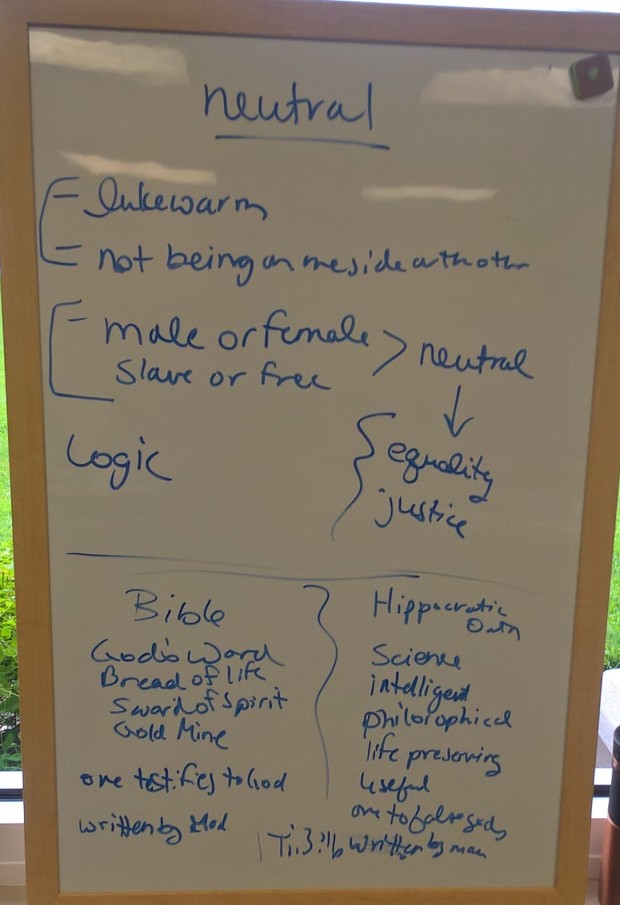
5CT discussion notes defining the word “neutral” and defining and comparing the Bible with the Hippocratic Oath.
For Rhetoric Formal Logic: This was my favorite strand. We laughed as we worked through some of the questions in Exercise One. For example, I asked your students to “invent a stipulative definition for the word “ploff” (See Introductory Logic, Exercise 1, #4, Exercise 1). Each student put their all into this and their answers were spectacular and very diverse. Answers like… (I had to share these with you)
Ellie: “Ploff”—when someone decides to squander their money by purchasing unnecessary objects.
Jacob: “Ploff”—it means to say “I’m better than you.”
Alejandro: “Ploff”—a not so loud sound like an explosion but a little quieter.
Aliyah: “Ploff”—A stew or gumbo of a darker color.
Christopher: “Ploff”—Directed excess and distraction clouding the truth.
Emma: “Ploff”—the art of sledding into an upright pole.
Sebastian: “Ploff”—Put on “Ploff” or deodorant.
I also asked them to write a persuasive definition of the word “television” from the point of view of a mother who thinks her children watch too much of it” (Go figure!). (See Introductory Logic, Exercise 1, #5). Here are some of their responses:
Student definitions for Logic (I see Proverbs 12:18 again).
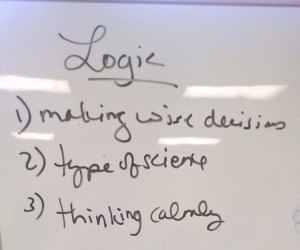
We did talk about the highlighting system (Page 200 Challenge B Guide) and students were asked to come in with some “blues” next week in Introductory Logic.
For Logic Pre-Algebra: We compared real numbers with imaginary numbers. We also compared numbers and numerals. We discussed these concepts in light of Ephesians 3:17-18, “And I pray that you being rooted and established in love, may have power together with all the saints to grasp how wide and long and high and deep is the love of Christ, and to know this love that surpasses knowledge that you may be filled to the measure with all the fullness of God.” Although, imaginary numbers cannot be measured on a number line, we know they are there (Understanding Mathematics, page 19 & 278). It is the same with God’s love, although it cannot be measured on a number line or even in measures we can comprehend (although He gives us a picture of the Cross—as a plumb line—in Ephesians 3:17-18), we can still grasp the reality of it through His Spirit.
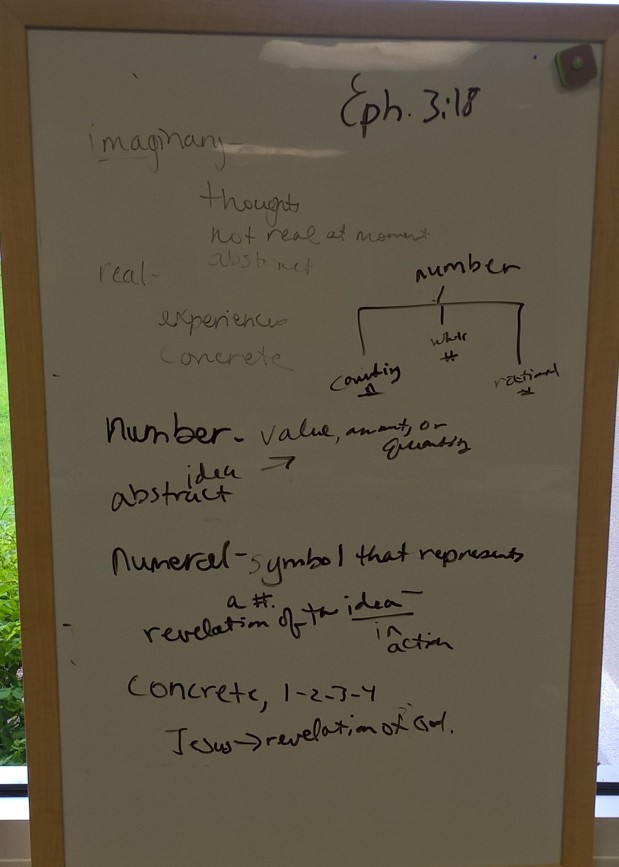
Conversation about imaginary and real; number and numeral.
We parsed and translated some math problems to end with. Everyone participated to the fullest and we ended with a good game of SNAKE.
For Exposition and Composition Persuasive Writing: We reviewed the concepts of Invention, Arrangement, and Elocution and created a class issue based on the Phantom Tollbooth.
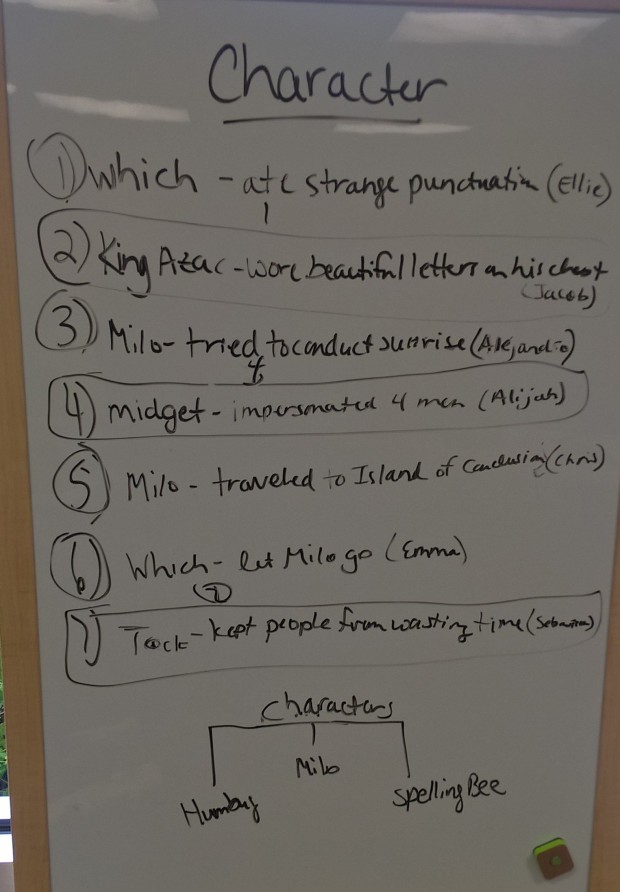
(Notice the Logic (Genus; Species) integration in LTW—Nice!) We took a blind vote on what issue to use and the winner was…
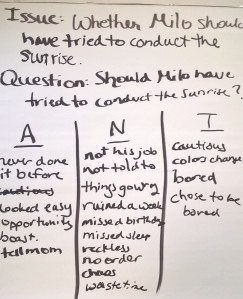
First Class Issue and ANI Challenge B-Phantom Tollbooth
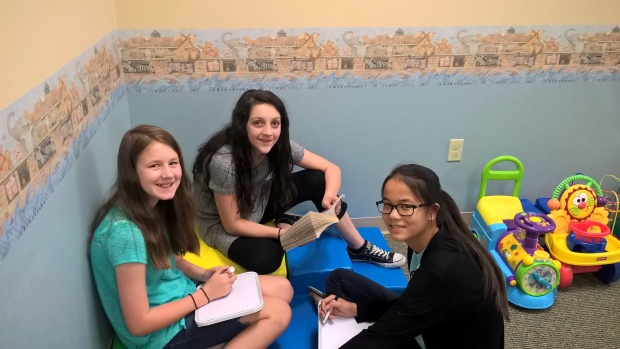
Socratic circle using Words Aptly Spoken (Phantom Tollbooth).
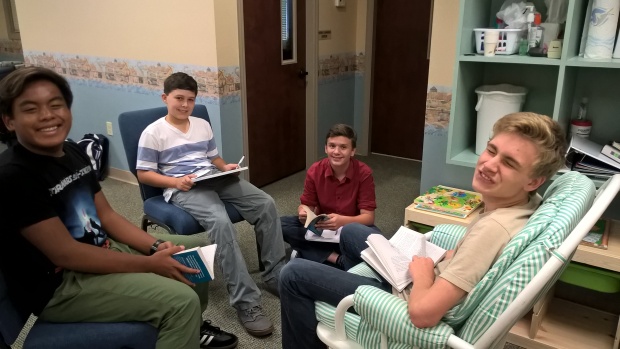
Socratic Circle using Words Aptly Spoken (Phantom Tollbooth)—I told him I was posting this picture (thus the funny face).
Once again, we hit on Proverbs 12:18 in light of page 44 (The Phontom Tollbooth).
“I never knew words could be so confusing,” Milo said to Tock as he bent down to scrath the dog’s ear.
“Only when you use a lot to say a little,” Answered Tock.
Milo thought this was quite the wisest thing he’d heard all day.
We talked about Proverbs 10:19, “When there are many words transgression is unavoidable, But he who restrains his lips is wise.” In our socratic circles, students discussed the question, “Is it ever necessary to use a lot of words to say a little?”
Some responses were:
“When writing something that requires a certain amount of words” (one student gave the requirements for our History of Science Assignment.)
“When writing a timed speech.”
“When defining terms and redefining terms to help another person understand what is being said.”
One student also drew a parallel between Rhyme and Reason and Moses. Rhyme and Reason, who grew up in the palace were banished from the kingdom, only to return later in a heroic kind of way. Ultimately we pointed to Jesus and decided that without Jesus and without His Word, we are just “Doldrums.”
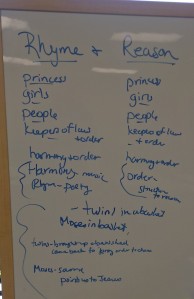
5CT notes based on defining and comparing Rhyme and Reason.
For Debate Current Events: We had an excellent conversation about right-to-life issues specifically abortion (another article from Christianity Today entitled “Supreme Court Weighs Why Abortion Clinics Are Closing at Record Rates” http://www.christianitytoday.com/gleaning/2016/march/supreme-court-why-abortion-clinics-closing-record-texas.html). We again looked at this article in view of the Hippocratic Oath and worked through a Current Event Form. Our students had some excellent responses to the question, “Why is viewing current events from a Christ-centered worldview important?” In closing, here are some of their responses…
Christopher: “So we can look at it through the eyes of God rather than the eyes of the world.”
Aliyah: “Our worldview decides what our reaction/action will be to the event and helps us to carry out His commands through it.”
Alejandro: “By seeing things from Christ’s world view, we will not lose faith through the hard times.”
Ellie: “You can stop worrying about the future, knowing that it’s in God’s hands and you can defend what you believe in because you stand in the truth.”
Jacob: “We will not become distracted by what’s happening in the world if we view current events through the eyes of God rather than the eyes of the world.”
Emma: “It is important to have a biblical perspective on current events so that we can decide for ourselves what is right and wrong and form our opinion based on the Bible.”
Sebastian: “It is important because the world is corrupt and a Christian view makes it easier to know how to help.”
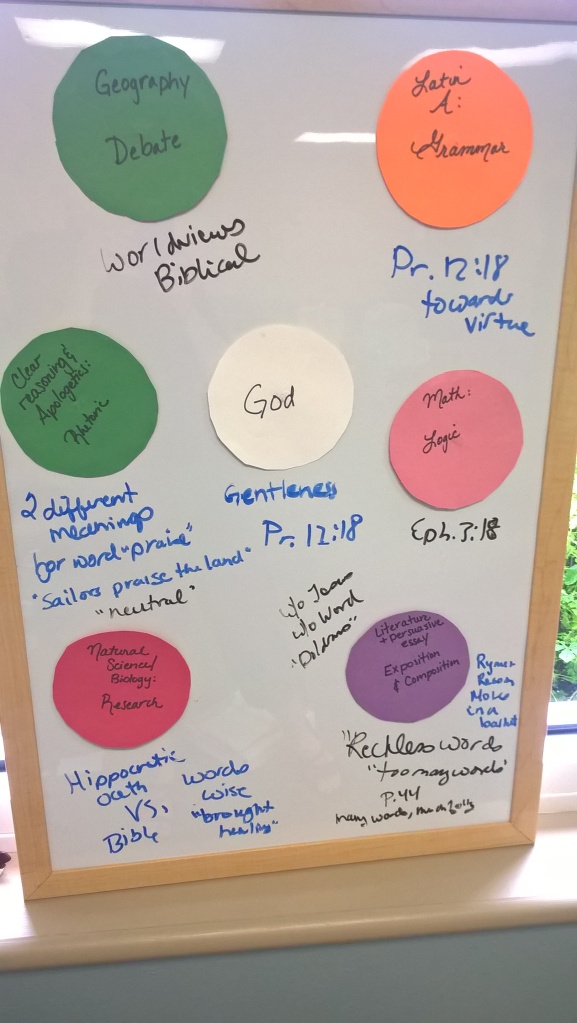
Our topic wheel for the day.






